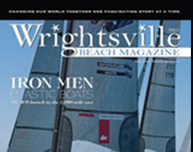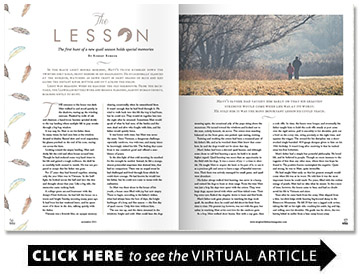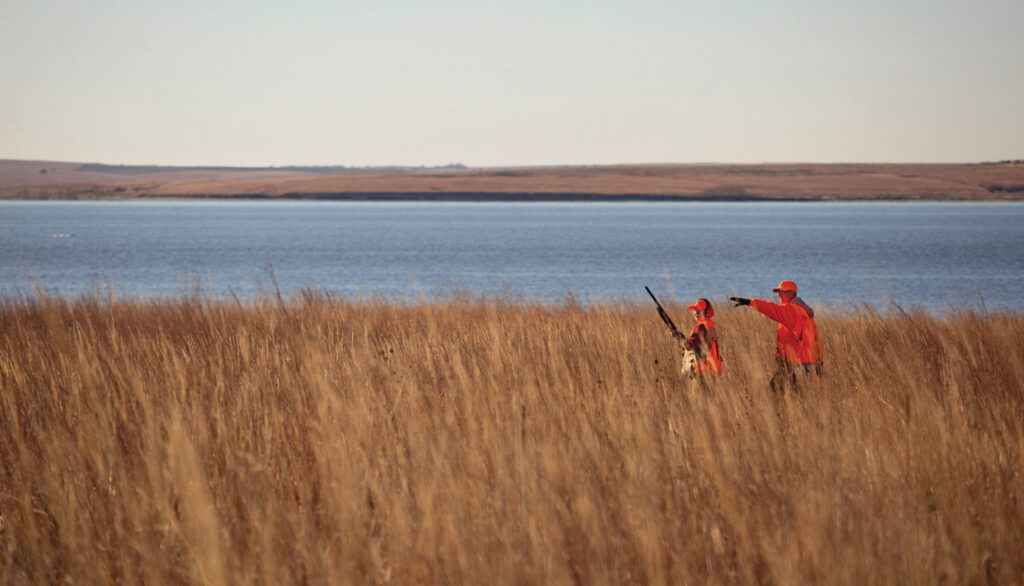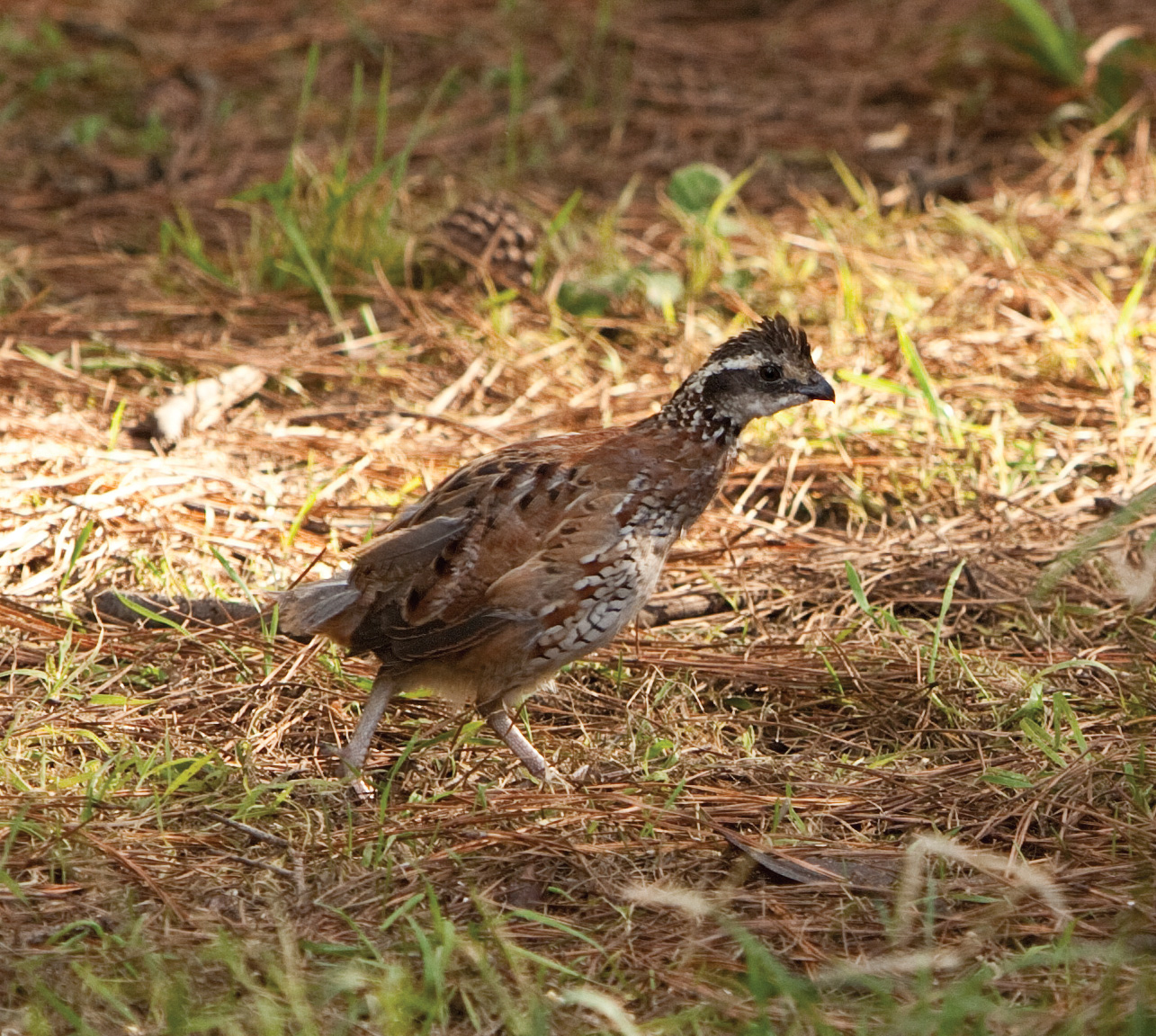The Lesson
The first hunt of a new quail season holds special memories
BY Robert Rehder
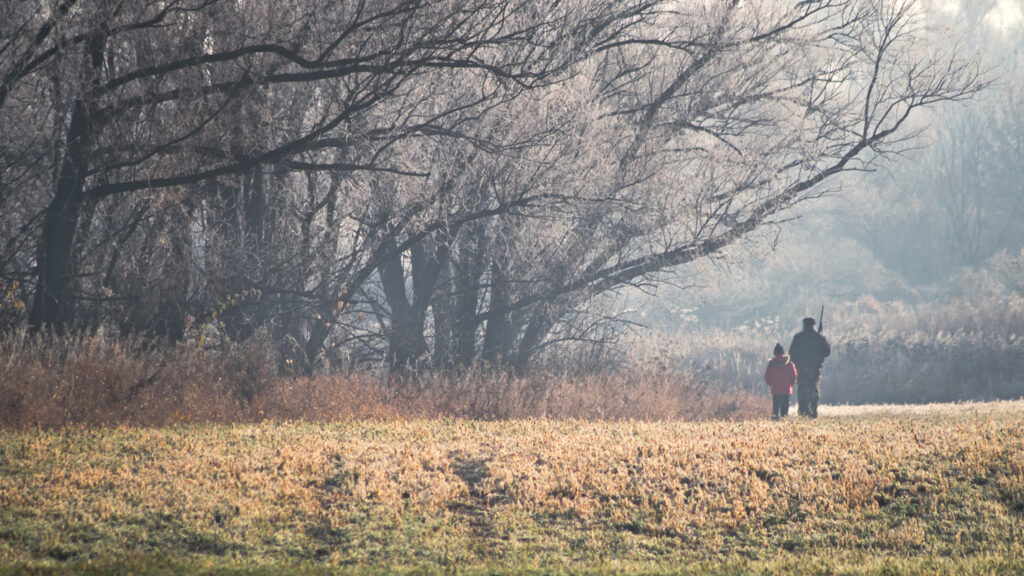
In the black light before morning, Matt’s truck rumbled down the twisting dirt road, frost shining in his headlights. He occasionally glanced at the horizon, watching as dawn crept in faint shades of blue and red along the distant river bottom and out across the fields.
Light was breaking when he reached the old farmhouse. From the backyard, the Llewellin setters woke and began a pleading, almost human chorus, moaning softly to hunt.
The entrance to the house was dark. Matt walked in and stood quietly in the shadows, staring up the winding staircase. Flanked by walls of oak and chestnut, a hand-worn banister spiraled slowly to the top landing where sunlight fell in gray streaks through a big bay window.
It was easy for Matt to see his father there. So many times, he had seen him at the window, dressed in khakis, flannel shirt and wool suspenders, his glasses perched on the end of his nose, staring out across the farm.
Looking toward the empty landing, Matt suddenly felt the cold and silent house around him. Though he had endured some very hard times in his life and gained a tough resilience, the shell he so carefully built seemed to vanish. He was not prepared to accept that his father was gone.
For 27 years they had hunted together, missing only the year Matt was in Vietnam. In the half-light, he looked across the hall and into the den and thought about that year. Like a big tide, the memories came rushing back.
A college-green second lieutenant with the Army’s 82nd Airborne, he had left the house on a warm and bright Sunday morning many years ago. It had been his last weekend leave, and he spent most of it there in the den, talking quietly with his father.
Vietnam was a feverish blur, an opaque memory clearing occasionally when he remembered faces. It wasn’t enough that he had lived through it. He tried to walk back into this life the way it had been, but he could not. They would sit together late into the night after he returned. Sometimes Matt would speak of what he had seen, of the battles and the men dead and alive who fought with him, and his father would quietly listen.
It was better with time, but Matt was never the same. Since Vietnam, a dangerous challenge, especially outdoors, was welcome, and many times he knowingly risked his life. The feeling that came from it was somehow good and offered a semblance of peace.
Matt’s father had taught him early on that his greatest strength would come when life was at its worst. He told him it was the most important lesson he could teach.
In the dim light of that cold morning, he searched for the strength he needed. Instead, he felt a strange, almost primordial emptiness that drained him, that had no comparison. There was no sequel event he had challenged and lived through from which he could draw courage. He had known he would lose his father, but he could not come to terms with the realization.
So Matt was there alone in the house of his youth, a house once filled with joy but now empty. There to begin, according to his father’s wishes, what had always been the best of days, the bright harbinger of a long and fine season — the first day of quail season. Only this time without him.
The sun was up, and the dawn streamed in the windows, bright and cold. Matt could hear the dogs moaning again, the occasional yelp of the pups rising above the monotone. He turned toward the windows and looked out to the neat, orderly kennels, six across. The setters were standing balanced on the front gates, ears perked, eyes staring, waiting.
Training and working the setters had been a treasured part of his father’s life, and as he watched them Matt knew that somehow, he and the dogs would not be alone that day.
Matt’s father had been a devoted quail hunter, and although some chose to call bird hunting a sport, he held it in much higher regard. Quail hunting was more than an opportunity in the field with his dogs. It was a source of joy — a time to cherish. He taught Matt to respect the land, to be part of it, to use it as a precious gift and never to leave a sign of harmful intervention. Their farm was actively managed for small game, and quail were abundant.
His father always walked bird hunting, was never in a hurry, and trained his dogs to hunt at close range. From the time Matt was just a boy, his days were spent with the setters. They were large dogs, square-jawed with white and blue-ticked coats. Their big setter eyes flashed the singular desire to hunt and find birds.
Matt’s father took great pleasure in watching his dogs work quail. An excellent shot, he could and did shoot his limit from time to time. His greatest joy, however, was not with the gun, but rather in watching Matt as his son’s love for the outdoors grew.
As a boy, Matt walked short hunts, first with a cap gun, then a cork rifle. In time, the hunts were longer, and eventually his father taught him to hold the cork rifle steady at port arms over the rigid setters, pull it smoothly to his shoulder, pick out a bird on the covey rise, swing precisely at the right time, and squeeze the trigger. The reward for his discipline was a short-stocked single-barreled .410-gauge shotgun given to him on his 10th birthday. It wasn’t long after receiving it that he tucked away his first bobwhite.
Matt’s father had a simple but powerful philosophy. He loved life, and he believed in people. Though no more immune to the vagaries of fate than any other man, where there was hope he found it. The positive forever outweighed the negative. Quiet and strong, he was to Matt, quite invincible.
He had taught Matt early on that his greatest strength would come when life was at its worst. He told him it was the most important lesson he could teach. For years, filled with the restless energy of youth, Matt had no idea what he meant. In the course of time, however, the lesson came to bear, and had no doubt saved his life in Vietnam and since.
Years after he came back from the army, Matt slipped from a thin, ice-slick ledge while hunting big-horned sheep in the Bitterroot Mountains. He fell 30 feet into a jagged rock ravine, taking the fall on his right side, crushing his ankle, leg and hip, and rolling onto his shoulder. His guide was far above, the two having hiked in earlier from a base camp hours away.
Matt’s heavy goose-down jacket absorbed some of the upper body impact, enough so that he remained conscious. The guide, not able to reach Matt, scrambled frantically down the mountain for help. He knew Matt had little chance to survive the fall, much less night, when the temperature could plunge 50 degrees.
As day passed from dusk to darkness, Matt felt his life slipping away. Inching slowly toward deep shock and unconsciousness, he knew all he had to do was close his eyes and it would be over. It was bitterly cold, he was in extreme pain, and the thought of giving up was welcome.
But each time he closed his eyes and began to yield, he would see the tanned, lined face, the straight jaw, the unflinching eyes. He could hear the steady, gravelly voice and the lesson. Maddening though it was, he clung to the last shred of strength in him. When the medevac team rappelled down the rock face, Matt was close to death, lapsing in and out of consciousness. Within minutes, the near-lifeless body was secured in a wire rescue litter, hauled up into the helicopter, and whisked away.
He had fought through Vietnam and the night in the Bitterroots and he lived, though he never quite healed from either. There were other times, harrowing, almost reckless. But the farm, the wing-shooting, the gentle roll of the land and the bond with his father had been the call home, the return to peace, the refuge, if only for a short time each year.
The remaining frost cover had melted away with the morning sun.
It was a fine day for bird hunting . . . the kind of day his father had loved.
That morning, there in the dim light of the old farmhouse, Matt fought once more. Slowly, as he began to remember, to feel his father’s presence in the old house, to share again the times together, there was a very slight though unmistakable trace of reconciliation. It was an acceptance of sorts, an understanding.
The big clock on the mantle struck once, then six more times, startling Matt from his thoughts. He looked again toward the landing, then out across the meadow toward the sleeping fields and the brown, honeysuckle-choked hedgerows. He had known his father was not well and had not been for some time. He had seen it plainly in his face. Since the trip to the hospital, he had spent most of the last few months there at the landing just watching, fascinated even as his life drew to a close by the delicate, intertwined balance of man and nature.
In the beginning, Matt did not know everything the doctors had told his father and had not pressed for an explanation, though there were many opportunities to discuss it. One afternoon, soon after his father had been to the hospital for the second time, he and Matt were sitting in the den talking over old hunts. It was then, in his calm and steady way, that he told Matt.
Outside the bay window, a creek split the meadow. It crept down from a big cypress swamp and wandered through the checkered pattern of soybean, corn and cotton. The swamp stretched for miles, its border a dense jungle of catbrier, gallberry and myrtle that loomed above the cultivated fields. Hedgerows striped the land and patches of native grasses, berries and plants stood at the head of woods and the juncture of fields.
Those were the places Matt and his father found quail. The birds lived in the swamp borders and fed out to the grain fields, coveying along the maze of hedgerows and ditch banks.
Matt left the house and walked out onto the weathered back porch. He went to the kennels and released two veterans, Swish and Dan, and one of the pups. He walked to the truck, pulled on his chaps and vest, loaded the 16 gauge with No. 8 loads, and put 10 rounds in his pockets.
The remaining frost cover had melted away with the morning sun. It was a fine day for bird hunting. Cold, clear and ripe with the smell of cut soybeans, it was the kind of day his father had loved.
Matt walked a brushy path down below the house to a point where a thick hedgerow met the field near a head of dense full-growth forest. A small triangle of short cover bordered the wood’s head, the base of the triangle lying along the tree line with the point opening toward the fields and hedgerows beyond.
A stream ran amber-colored through the forest edge. Red and yellow leaves drifted in the shallow current, spinning slowly toward the distant river. Matt crossed the stream where it was narrow and climbed up the other side to come in behind the triangle at its base, hoping to catch a covey on the back track and flush them through the clearing away from the forest into the hedgerows.
On the far side of the creek, the cover was damp and cold and the scent conditions perfect. The dogs had worked out the edge and both stream banks, finding nothing, and had moved toward the triangle. Suddenly they struck birds, slinking to a crawl, trailing upwind through heavy gallberry toward a stand of wiregrass, their noses in the forest floor. The two veterans worked side by side, the quivering wide-eyed puppy honoring the lead dogs. The hot scent of quail was deep in their noses as all three inched closer to the open triangle almost on their bellies.
As suddenly as it began, the movement stopped. Morning light fell in deep shafts through the forest canopy, illuminating the scene. The dogs were frozen like white statues, Dan’s head cocked slightly left, Swish staring straight ahead, eyes transfixed. The puppy no longer quivered but held solid, head high, backing the point two paces behind Swish.
Matt stood just behind his dogs at the base of the triangle, and though he had seen a thousand points, still he felt the rush of excitement, the peculiar bond of man and dog and place, the strong undiminished emotion of the hunt.
But he also felt the stark in that day — a day he thought would never come but now he faced.
As he stood there, a wind came across the fields whispering wild into the thicket, moving through the ancient walls of willow, muscadine and bamboo. As it did, and in those few quiet seconds before the world thundered into flight, time seemed to melt away, the present becoming the past, the hallowed forest suddenly revealing a little boy alone and standing ready, his small hands holding the .410 at port arms.
And for those seconds, the boy, in quiet desperation, longed for his father. Longed for him to see the point just one more time, longed to watch again the fluid arc of the shotgun as it came to his father’s shoulder, the swing, the squeeze, the bird falling out cleanly. Longed to brush up against him, smell the bay and pine on his coat, see once more the gentle smile; thank him one last time.
A hawk screamed high above, its piercing call shattering the eerie calm, and suddenly the boy was gone. Matt’s eyes focused again. He looked over the setters, lightly touching the safety of his shotgun, tracking where the birds would flush, choosing an opening for the shot.
Matt breathed the sharp morning air and his strength returned, the lesson having come to bear yet once more, and he stepped into the first flush of a very special season.
First Published in Quail Unlimited Magazine, January 1997.
